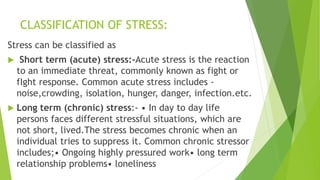stressmanagement-200716190219.pdf
- 1. Stress management Presented by Anjali Vijayan 2nd year B.Ed Physical science
- 2. WHAT IS STRESS ? ’üĄ Stress is the reaction people have to excessive pressure or other types of demand placed upon them. It arises when they worry that they can't cope. ’üĄ The "Wear and Tear" our bodies experience as we adjust to our continually changing environment ’üĄ Condition or feeling experienced when a person perceives that demands exceed the personal and social resources the individual is able to mobilize ’üĄ Can HELP or HINDER depending on how we react to it
- 3. It has physical and emotional effects on us and can create positive and negative feelings. ’üĄ Eustress:- Eustress is the positive stress that stimulates a person to function better. This is called as friendly stress or positive stress.ŌĆó It has a good influence on human in terms of physical and mental ability. ’üĄ Distress:-Distress is a negative stress that may causeillness.This is also called as harmful stress.Negative stress could be also described as aburning out.
- 4. CLASSIFICATION OF STRESS: Stress can be classified as ’üĄ Short term (acute) stress:-Acute stress is the reaction to an immediate threat, commonly known as fight or fIght response. Common acute stress includes - noise,crowding, isolation, hunger, danger, infection.etc. ’üĄ Long term (chronic) stress:- ŌĆó In day to day life persons faces different stressful situations, which are not short, lived.The stress becomes chronic when an individual tries to suppress it. Common chronic stressor includes;ŌĆó Ongoing highly pressured workŌĆó long term relationship problemsŌĆó loneliness
- 5. EFFECTS OF STRESS: The effects of stress generally fall in categories ’üĄ Short term effects of stress: 1. Physical changes: Physical symptoms are usually triggered by arousal of autonomic nervous system and includes increase in heart rate and blood pressure 2. Psychological changes : It includes lack of concentration, Muscle ache, Headache, and Insomnia. Loss of memory, inability to make decision,Forgetfulness, Confusion, Faster breathing,
- 6. 3. Emotional changes:- Emotional response may include Anxiety, Nervousness, Frustration, Anger, Irritability 4. Behavioral symptoms:-Impact of stress also affects the behavior and present as pacing, Fidgety movement, Nail biting, Smoking, Drinking, and Throwing things
- 7. ’üĄ Long term effects of stress: 1. Behavioural changes:- behavioural disorders like, fearfulness, Obesity, Alcoholism, Drugs addiction. 2. Physiological changes:- physiological disorders like, Hypertension,Heart diseases, skin diseases ,even cancer.
- 8. 3.Emotional changes:- Emotional disorders like, Chronic anxiety, depression, fear and phobia, Mental disorder, Personality changes. 4.Cognitive changes:- Cognitive disorders like, Memory problem , Obsessive thoughts, Sleep disorder.
- 9. STRESS MANAGEMENT:ŌĆó Stress management involves the use of the coping strategies in response to stressfulsituations. Coping strategies are adaptive whenthey protect the individual from harm or strengthen the individual's ability to meetchallenging situation.
- 10. Strategies of coping with stress; ’üĄ Awareness;-The initial step in managing stress In awareness-to become aware of the factors that create stress and the feeling associated with astressful response. As one can become awareof stressors, he or she can omit, avoid, or accept them.
- 11. ’üĄ Got organized; Coping with stress is all about planning. You can plan to fall or plan to succeed. Organized time for work, family, hobbies, spiritual time,time with friends and time alone, time forexercise and time for relaxation
- 12. ’üĄ Visualized the best outcome;-Coping with stress knows how to deal with a stressful situation before it occurs. Rehearse how you are going to handle it. Picture yourself being successful in coping with stress.
- 13. ’üĄ Don't postpone action;-One of the best strategies for coping withstress is not to put off actions until tomorrow if you can do it today. Coping with stress become more difficult when you defer. Do your least favorite chores first, followed by rewards.
- 14. ’üĄ Be realistic;-Set realistic goals. Emphasize quality over quantity. Work at a leisurely pace, taking breaks often. ’üĄ Sleep, eat, and exercise;-Coping with stress is all about treating yourbody properly. Eat food that nourish you,exercise and get plenty of sleep.
- 15. UNHEALTHY WAYS OF COPING WITH STRESS ’üĄ Smoking ’üĄ Drinking too much ’üĄ Over eating or under eating ’üĄ Using pills or drugs to relax ’üĄ Sleeping to much ’üĄ Withdrawing from friends, family, and activities ’üĄ Zoning out for hours in front of the T.V orcomputer. ’üĄ Taking your stress out on others (lashing out,angry outbursts, physical violence)
- 16. Advantages of stress management ’üĄ Effectively managing stress improved overall health ’üĄ Stress management programs are drug- free. ’üĄ stress management programs put you in charge and give you a sense of control ’üĄ leads to enhanced self-esteem, ’üĄ Less likelihood of depression, and ’üĄ An overall improvement in quality of life
- 17. Thank you
















